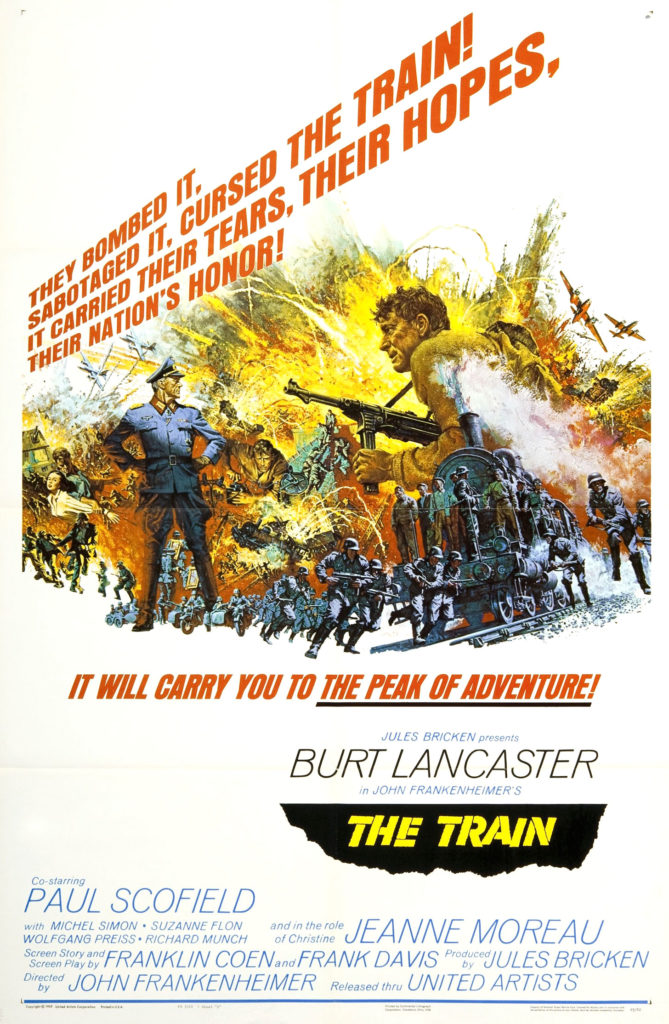One day into filming of 1964’s The Train, director Arthur Penn was fired at the urging of star Burt Lancaster and replaced with John Frankenheimer. Penn had apparently conceived the film as largely a cerebral examination of the effect and importance of art to the French national consciousness during the Nazi occupation. A not unworthy aspiration, and one that could someday make a fine film. In hiring Frankenheimer, who had such films as Seven Days in May and The Manchurian Candidate under his belt, the decision was made that the plot of The Train should be driven by tension and action.
The Train takes place in the waning days of the Nazi occupation of Paris in 1944. The allied armies are just over the horizon, and a scheming Nazi Colonel named von Waldheim (Paul Scofield) has put in motion a plan to ship hundreds of artistic treasures from a Paris museum on a train to Germany. The names are stamped on the side of shipping crates during the opening credits for emphasis: Picasso, Manet, Renoir, Van Gogh, Degas, Cezanne, etc. In today’s marketplace, surely tens of billions of dollars worth of art, all being spirited away by the evil Nazi regime.
Standing in von Waldheim’s way is a pile of red tape, which he conveniently chooses to ignore, and Paul Labiche (Lancaster), a French railway inspector who is also a member of the Resistance. Reluctant to intervene in the last days of the occupation to delay the train, due to its lack of strategic significance, Lancaster eventually  mobilizes what remains of his small band of saboteurs to keep the train, and the treasures inside, from leaving France.
mobilizes what remains of his small band of saboteurs to keep the train, and the treasures inside, from leaving France.
Von Waldheim makes the mistake of forcing Labiche to drive the train, and thus the plot finds it method of keeping Labiche near the train at all times. It’s contrived and self-serving, but doesn’t feel all that improbable. The following scenes justify every twist and turn the filmmakers could have made to keep Labiche in the center of the story.
The train is traveling inexorably towards Germany, it seems, and the audience isn’t let in on how the Resistance plans to prevent its progress until those plans are set in motion. At multiple points it appears that all is lost for the heroes of the film, then the veil of deception is lifted.
While The Train hardly moves at the pace of today’s action films, it never lets up, and the outcome is a mystery up until the credits roll. Frankenheimer proved to be the right choice to direct this film. This and the other two films mentioned above make for a nice troika of consecutive efforts by Frankenheimer, all dealing well with tension, although this is the only one of the three that also features a good deal of action.
A plus for this film is the way in which it was shot. All of the trains are real. No models. Engines, boxcars, all period authentic, and Frankenheimer wasn’t afraid to smash a few of them up. There is a noticeable lack of quick cuts in the shots, even during action scenes. Instead of feeling at the mercy of multiple cameras and locations, all of which place the viewer at a passive distance from events onscreen, the long shots in The Train serve to bring camera lens and viewer’s eye closer together.
Labiche and von Waldheim make an interesting pair of antagonists. Von Waldheim is intractable, the type of person who makes his enemies through his arrogance. Labiche is the perfect counterpart, as it is in his nature to stand up to bullies. The two share ample screen time early on, and their characters’ mutual loathing of each other make it inevitable that The Train will be as much about them as it is about the cargo in the boxcars. And that’s perfectly fine. There is a definite hero to root for, and a definite villain to jeer.
Other than Lancaster and Scofield, The Train is made up entirely of native French and German actors. This must have presented a problem in post-production, as many of their voices have been overdubbed. All performed well. Also, while there are a number of superfluous characters, no one mailed it in.
Historical accuracy takes a backseat at times, as does depth. This being a straight Hollywood studio product, there’s only so deep it could go. Indeed, it was a search for depth that cost Arthur Penn his job. All that aside, The Train is one of those well-made films that gets lost among the sea of classics of the era, but is worth the effort to seek out.
